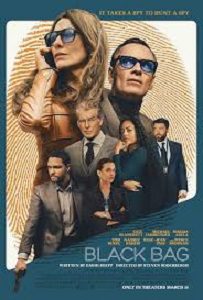Black Bag Movie Review: Sharp, Suspenseful, and Full of Espionage Intrigue.Moviesgod

Black Bag Review: A Tense Spy Thriller Wrapped in Secrets and Silence
A Stylish Dive into the Shadows of Espionage
Steven Soderbergh’s Black Bag is a sleek, slow-burn thriller that’s more about what’s not said than what is. Instead of high-speed chases and exploding cars, the film dives deep into the psychological toll of being a spy—especially when your closest relationships are also your biggest liabilities.
At the heart of the film are British intelligence officers George (Michael Fassbender) and Kathryn (Cate Blanchett), a married couple whose professional lives are all about secrets. George is assigned by his superior, Meacham (Gustaf Skarsgård), to investigate the leak of a powerful piece of software linked to a potential nuclear threat. The shocking twist? Kathryn is one of the five key suspects. Suddenly, George finds himself in a terrifyingly quiet war of observation—one where even a glance or a word could mean betrayal.
George’s confession, “I watch her, and I assume she also watches me,” perfectly sums up the tension. Fassbender delivers this line with a mix of pain and calculation, capturing the core theme of Black Bag: when love and loyalty are under surveillance, can you ever truly know the person across the table?
Smart Writing and a Focused Storytelling Style
Soderbergh wisely chooses to tell this story over the span of a single week. This tight timeline gives the film a “chamber drama” feel—everything happens in a short burst of pressure, but that pressure builds steadily with each scene. Rather than relying on action-packed sequences, the film leans into slow tension, careful dialogue, and subtle shifts in behavior.
There are no flashy explanations or spoon-fed answers. We’re thrown into the intelligence world with very little exposition, and it works. For example, the meaning of the term “black bag” is never directly defined. We understand its significance through one simple, effective scene. Clarissa (Marisa Abela), a satellite specialist, vents about not knowing her partner at all—highlighting how deeply the job isolates people from those they care about. Later, when George casually asks Kathryn where she’s going and she replies, “black bag,” it hits differently. The phrase isn’t just spy lingo—it’s a symbol of distance, deception, and double lives.
Fassbender and Blanchett: Cold Charisma and Cracks in the Mask
The success of Black Bag heavily relies on its two leads, and both deliver quietly powerful performances. Michael Fassbender plays George with a calm exterior that’s constantly on edge. He doesn’t need to say much—his long silences and searching looks are full of meaning. There’s something about his controlled presence that evokes characters from Cold War-era cinema, particularly Stanley Kubrick’s Dr. Strangelove.
Cate Blanchett is just as compelling. As Kathryn, she’s composed and unflappable, even when things around her begin to spiral. But beneath her restraint is something else—doubt, fear, and maybe even guilt. Their chemistry is icy yet electric, like two chess players who may love each other but can’t stop questioning the next move.
Their relationship is the film’s core mystery. Do they trust each other? Are they playing each other? Or both? The film wisely leaves much of this up to interpretation, which only adds to the suspense.
Sharp Supporting Cast and a World That Feels Lived-In
While Fassbender and Blanchett carry the film, the supporting cast adds valuable texture. Rege-Jean Page and Naomie Harris deliver solid performances as fellow agents entangled in both personal and professional relationships. Harris plays Zoe, the agency’s psychiatrist, while Page is Colonel James Stokes. Their intense exchange is well-acted but perhaps a bit unnecessary—it repeats emotional beats we’ve already seen and doesn’t add much new.
Marisa Abela is a quiet standout as Clarissa, a character used to highlight the emotional cost of working in intelligence. There’s even a touch of dry humor in her subtle crush on George, which adds a layer of humanity to a film often steeped in stoicism. Pierce Brosnan and Tom Burke also make memorable appearances, filling out this secretive world with gravitas and credibility.
Soderbergh resists the urge to over-explain the twists and turns. There’s a subplot involving a Russian operative in Zurich that unravels with little hand-holding. You’re expected to pay attention and piece things together yourself—a refreshing change from modern thrillers that often overdo it with exposition.
Not Every Move Lands, But the Game Is Worth Watching
Despite its many strengths, Black Bag isn’t without its weak spots. Some scenes feel like filler, like the second confrontation between Zoe and Stokes, which doesn’t bring much new insight. In a film where every second is meant to build tension, a few moments like these feel like missed opportunities.
Still, these are minor bumps in an otherwise sharp and gripping thriller. The film keeps its focus on its themes: trust, deception, and the impossibility of total honesty when your entire life revolves around keeping secrets. What makes Black Bag so compelling is how it handles these ideas without spelling everything out. The suspense isn’t just about what might happen—it’s about what we can’t see, what isn’t said, and what we can only guess.
Final Thoughts
Black Bag isn’t your typical spy thriller. It’s not about explosions or cool gadgets. It’s about people—complicated, broken, brilliant people—living lives full of secrets, even from the ones they love most. With restrained performances, intelligent writing, and an elegant visual style, Steven Soderbergh delivers a film that makes you think, watch closely, and question everything.
It’s a story where trust is a trap, love is a liability, and silence often says more than words. And in today’s world of loud, fast-paced blockbusters, a film that whispers its secrets feels refreshingly bold.
Leave a Reply